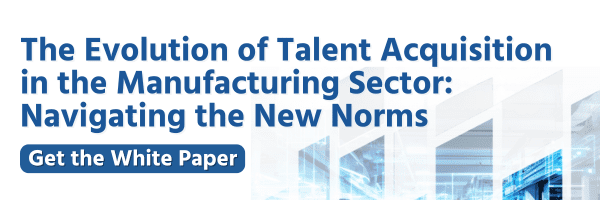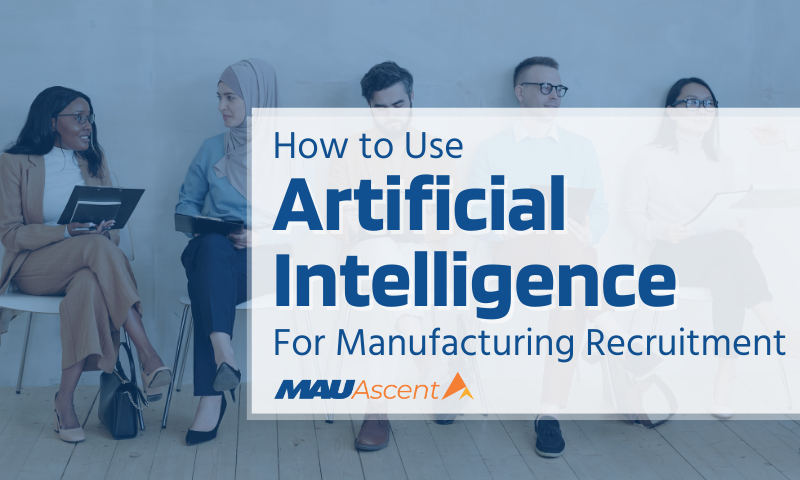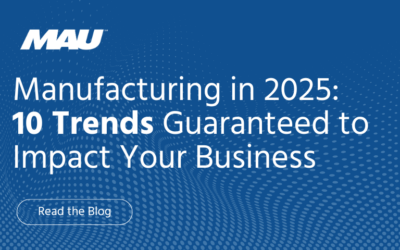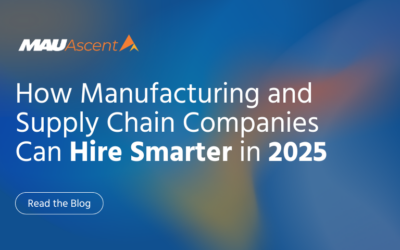The growing need for AI in manufacturing recruitment is evident as the industry requires a highly skilled and adaptable workforce. Traditional recruitment methods often fall short in meeting these demands. This is where AI steps in, offering a more efficient and accurate way to identify top talent. By integrating AI into the recruitment process, companies can streamline their hiring practices and stay competitive.
Over a third of hiring leaders have embraced AI in recruitment, and 40% are invested in upskilling their talent force by integrating AI into their systems. One of the most significant advantages of using AI in recruitment is the ability to automate repetitive tasks. This includes screening resumes, scheduling interviews, and even conducting initial assessments. By automating these tasks, HR managers can focus on more strategic aspects of recruitment, such as building relationships with candidates and improving employer branding.
So, How Can You Use AI For Recruiting?
1. AI Enhances Candidate Screening
Automating resume reviews is a significant advancement over traditional methods, which are often time-consuming and prone to human error. AI can efficiently scan resumes for relevant keywords and qualifications, ensuring that only the most suitable candidates progress in the hiring process. Recruiters can significantly reduce the time spent on sourcing by around 30% with AI.
AI algorithms can analyze various data points, such as past job performance, skills, and cultural fit, to predict a candidate’s potential success within the company. This predictive analysis enables HR managers to make more informed decisions, thereby reducing the risk of bad hires.
Providing a personalized candidate experience is crucial for attracting top talent. AI can tailor communication and feedback based on individual candidate profiles, making the recruitment process more engaging and enjoyable. A positive candidate experience significantly improves your employer brand and attracts more high-quality applicants.
2. Streamlining Interview and Onboarding Processes
Automated interview scheduling can transform the often chaotic process of coordinating interviews, especially when multiple candidates and hiring managers are involved. AI-powered scheduling tools streamline this by identifying mutually convenient times for all parties, thus minimizing scheduling conflicts and facilitating a smoother interview process.
AI can also revolutionize the interview process itself by conducting initial video interviews. These AI-driven interviews evaluate candidates’ responses, tone, and body language, offering HR managers valuable insights. This not only accelerates the interview process but also ensures a more objective assessment of candidates.
Collecting and analyzing interview feedback is crucial for making informed hiring decisions. AI can compile feedback from multiple interviewers, highlight common themes, and provide a detailed overview of each candidate’s performance. This enables HR managers to make more accurate and unbiased hiring choices.
Additionally, AI can assist with onboarding and training for manufacturing workers. By using AI-driven platforms, companies can deliver personalized training programs that cater to individual learning styles and paces, ensuring that new hires are quickly brought up to speed and integrated into their roles effectively.
3. Boost Employee Retention and Development
Retaining top talent in the manufacturing sector is just as important as hiring the right candidates. As of 2021, automation had led to the loss of over 7.2 million manufacturing jobs, and projections indicated that the industry would lose an additional 444,800 jobs by 2029.
AI can analyze employee data to identify patterns and predict potential turnover among manufacturing workers. This enables HR managers in the manufacturing industry to take proactive measures to improve employee satisfaction and retention, ensuring that skilled workers remain within the company.
AI can also create personalized development plans for manufacturing employees based on their specific skills, career goals, and performance. These tailored plans help workers grow within the company, increasing their job satisfaction and reducing the likelihood of turnover. By investing in the professional development of manufacturing employees, companies can build a more capable and motivated workforce.
Additionally, AI-powered tools can monitor employee engagement within the manufacturing workforce and provide real-time feedback to HR managers. By identifying areas of concern and addressing them promptly, manufacturing companies can create a more supportive and engaging work environment. This helps to foster a culture where employees feel valued and motivated to contribute to the company’s success.
4. Enhance Recruitment Marketing Strategies
AI can play a pivotal role by creating targeted job advertisements that reach the most relevant audience. By analyzing candidate data, AI ensures job postings are seen by individuals who are more likely to be a good fit for the company, thereby improving the quality of applicants. This targeted approach is crucial for manufacturing companies looking to attract skilled workers who meet specific technical requirements.
Social media is an effective tool for recruitment in manufacturing, and AI can help optimize social media campaigns. By analyzing engagement data, AI can identify the most effective platforms and content types for reaching potential candidates in the manufacturing sector. This enables HR managers to develop more successful social media recruitment strategies, ensuring they connect with candidates with the requisite skills and experience for manufacturing roles.
A strong employer brand is crucial for attracting top talent in the manufacturing industry. AI can monitor online reviews and social media mentions to provide insights into the company’s reputation. By identifying areas for improvement, HR managers can enhance their employer brand, making the company more attractive to high-quality candidates. This proactive approach helps manufacturing companies build a positive reputation, which is essential for recruiting and retaining skilled employees.
It’s Time to Modernize Manufacturing Recruitment
To remain competitive, manufacturing companies must stay up-to-date with the latest AI advancements and trends. Continuous improvement and innovation in AI-powered recruitment strategies are essential for attracting top talent. By leveraging AI, companies can streamline their recruitment processes and make more informed hiring decisions.
Integrating AI with technologies like applicant tracking systems (ATS) and customer relationship management (CRM) software creates a seamless recruitment process. The combination of these technologies enhances recruitment strategies and delivers better outcomes for manufacturing companies. The synergy between AI and these tools allows for more efficient candidate sourcing, screening, and management.
Promoting a culture of data-driven decision-making is crucial for maximizing the benefits of AI in manufacturing recruitment. Companies should encourage HR managers to use data insights to inform their decisions, leading to more informed and effective recruitment outcomes. This approach ensures that recruitment strategies are based on evidence rather than intuition, resulting in better hiring practices.
In addition to AI and integrated technologies, recruitment process outsourcing (RPO) and professional recruitment services are pivotal in modern manufacturing recruitment. These facilitators offer specialized expertise and resources to handle various aspects of the recruitment process, freeing internal HR teams to focus on strategic initiatives. By partnering with RPO providers and professional recruiters, manufacturing companies can access a broader talent pool and benefit from the latest recruitment best practices.
The integration of AI in manufacturing recruitment is no longer a futuristic concept but a present-day reality that offers numerous benefits. From streamlining candidate screening to enhancing diversity and inclusion, AI has the potential to revolutionize the recruitment process.
Explore the future of recruitment with AI to maintain a competitive edge in the manufacturing industry. Partner with us to leverage cutting-edge technology and ensure your success in this dynamic landscape.






